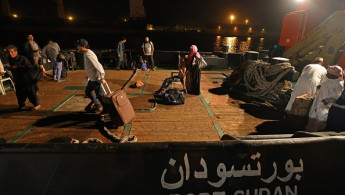Port Sudan: Clashes break out for first time since war began, witnesses say
The Sudanese army clashed with tribal militiamen in Port Sudan late Monday, witnesses said, the first fighting in the strategic coastal city in more than five months of war.
Thousands have been killed in fighting that has raged between army chief Abdel Fattah al-Burhan and his former deputy Mohamed Hamdan Daglo, who commands the paramilitary Rapid Support Forces (RSF), since April 15.
A witness in Port Sudan said there had been "an exchange of gunfire between the army and a militia led by Sheba Darar", a leader from the local Beja tribe, in the centre of the Red Sea city.
One witness who spoke on condition of anonymity said "soldiers deployed in the area after removing checkpoints set up by the militia", while others reported a "return to calm" soon after.
Port Sudan is home to the country's only functioning airport and hosts government officials as well as the United Nations.
They had relocated from the war-torn capital Khartoum, where battles between the army and the RSF continued Monday, according to witnesses who reported heavy artillery and air strikes rocking the city.
Port Sudan had been spared from the violence until Monday night's clashes broke out.
For the past three weeks, it has served as the new base for Burhan, who had until late August been holed up in army headquarters in Khartoum, besieged by RSF fighters.
Burhan has since made six trips abroad from Port Sudan in what analysts say is a diplomatic push to burnish his credentials in the event of negotiations to end the conflict.
Darar - who supported the army at the start of the war before raging against government officials moving to eastern Sudan - has not announced an alliance with the RSF.
Other tribes in Sudan's east have vowed to support the army.
Across Sudan, the violence has killed at least 7,500 people since April 15, according to a conservative estimate from the Armed Conflict Location & Event Data Project.
For the third day in a row, the RSF attacked army headquarters in central Khartoum, while the army responded with air strikes and drones, according to witnesses in the area.
Others in Omdurman, just across the Nile river, reported the army attacking RSF bases with artillery fire.
Intense fighting since Saturday had set fire to key buildings of Khartoum's skyline, turning emblematic towers in the city centre into blackened skeletons.
Both sides blamed each other for the destruction, which included the ministry of justice and the Greater Nile Petroleum Oil Company Tower - a conical building with glass facades that had become a landmark for the city.
The RSF said the buildings were destroyed in "targeted attacks" by the air force, while a statement from the Burhan-aligned foreign ministry on Monday described the fires as part of "an evil and systematic campaign by the rebel militia to destroy the capital".
Both forces have been accused by activists, aid groups and international organisations of targeting infrastructure and failing to protect civilians.
The war in Sudan has decimated already fragile infrastructure, shuttered 80 percent of the country's hospitals and plunged millions into acute hunger.
More than five million people have been displaced, including 2.8 million who have fled the relentless air strikes, artillery fire and street battles in Khartoum's densely populated neighbourhoods.




 Follow the Middle East's top stories in English at The New Arab on Google News
Follow the Middle East's top stories in English at The New Arab on Google News


![A group of Palestinians, foreign and Israeli activists gather to participated in an olive picking event on the land in the town of Battir, which is under threat of confiscation by Israel in Bethlehem, occupied West Bank on 8 November 2024. [Getty]](/sites/default/files/styles/image_330x185/public/2182930803.jpeg?h=199d8c1f&itok=__0LgGsa)